The Child in the Garden
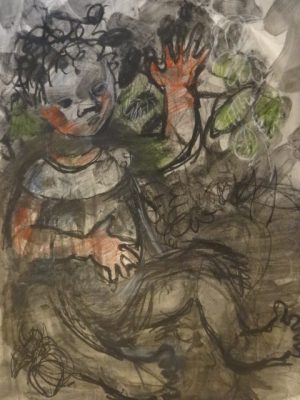 The child in the garden goes hop, skip and jump and sings to herself.
The child in the garden goes hop, skip and jump and sings to herself.
She dances her world into being.
The garden is dusty, dry sand, withered leaves and sharp-edged stones.
The child draws in the dirt.
The garden is a clearing in a forest, a marketplace of musical insects, a place where snakes wait and creatures watch.
The child weaves sticks and leaves into deities.
The garden is contained by a fence, contrived by another, controlled by a chemist, policed by plastic toys.
The child shuts her eyes and becomes an android warrior.
There is no garden.
Does the child hop, skip and jump, draw, make, or dream?
Dreaming alone – dreaming in the dark – dreaming at night
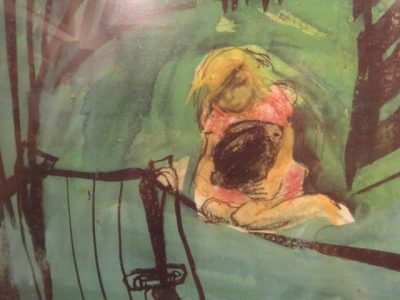 The child and the garden grow in secret and on their own, all alone.
The child and the garden grow in secret and on their own, all alone.
The sleeping child doesn’t have the same dreams as her sister, brother, mother or father.
The child, alone and in quietness, discovers that time is elastic and that she is flexible and changing.
The child, alone and quiet, travels to new imaginary worlds.
The child alone makes herself and her future.
The child is the poet, the painter, the dreamer, the genius
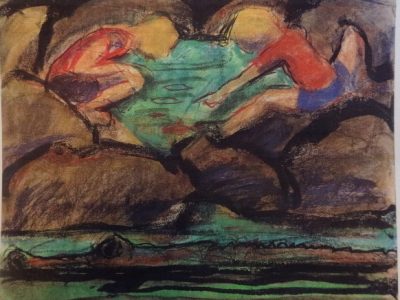 Every child is a poet, arranging her world without a teacher, telling stories without writing, singing to herself without words, making art without a paintbrush.
Every child is a poet, arranging her world without a teacher, telling stories without writing, singing to herself without words, making art without a paintbrush.
Every child is a dreamer with a creative imagination.
Why is one child selected out as that single genius?
When did all the others give up on their dreaming?
What, in our hearts, do we believe about ourselves who are poets and dreamers?
We are all nomads walking through our lives
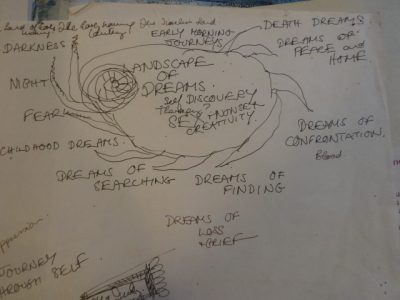 We are all nomads walking through our lives to the rhythm of our footsteps and the beat of our hearts. That movement makes us all poets and musicians. We are constructed physically of patterns and symmetries, so we recognise them in our environment. We observe the music of time, the dancing of the spheres as the sun and stars swing overhead. Our bodies teach us this, our hearts feel it and our brains understand it. We may remain rooted in the gardens that our mothers made, but we are nomads wandering in space and time as we age.
We are all nomads walking through our lives to the rhythm of our footsteps and the beat of our hearts. That movement makes us all poets and musicians. We are constructed physically of patterns and symmetries, so we recognise them in our environment. We observe the music of time, the dancing of the spheres as the sun and stars swing overhead. Our bodies teach us this, our hearts feel it and our brains understand it. We may remain rooted in the gardens that our mothers made, but we are nomads wandering in space and time as we age.
I loved Bruce Chatwin’s Songlines which has inspired some of my thoughts on this theme.
In the quiet darkness and solitude of the night we write ourselves into being
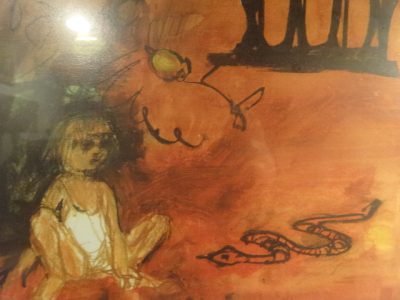 In the quiet darkness and solitude of night we think ouselves into meaning and find symmetry and significance in our lives. We make order out of chaos and we search for hope. In the morning we get up and write poetry.
In the quiet darkness and solitude of night we think ouselves into meaning and find symmetry and significance in our lives. We make order out of chaos and we search for hope. In the morning we get up and write poetry.
We don’t make the bed first or empty the dishwasher. We sit down at a table in the light from a rain-washed window and we scribble and play until the pattern emerges and the shape takes form and we uncover what we discovered we always knew in the dark when we were alone. Poetry and music, bread and roses are essential for our lives.
Poets who write at midnight and in the morning
Y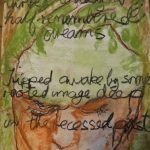 esterday I went to a poetry reading by Alison Chippindale from her book Mug Without a Handle.
esterday I went to a poetry reading by Alison Chippindale from her book Mug Without a Handle.
Her poems, written in the night and early morning in simple straightforward language, make meaning from bereavement and loss. They are very moving. It was very useful – as poetry should be.
I invite people who write poetry in whatever way they write and at whatever time they write it to please, tell me about it here in the comments – I would love that!
5 Comments on “Hop, skip and jump to the heartbeat of life”
Hello Ruth,
Your poem about the child at play, constraints and overcoming them through imagination brought to mind one I wrote ages ago, about play, awareness, regret, and resolve. Re-reading it has jiggled my creativity again; thank you!:
the chocolate door
———————–
peering back
through the gobbled hole
in the chocolate door
Gretl yearns to be
where jasmine beckons
and free leaves pulsate
with scattered surfeit of air
blue and clean to the lungs
draw deep
and
handspring across the dappled grass
while life leaps
Tia Azulay 07Dec02-08Oct06
Copyright © 2002, 2006 Tia Azulay
Thank you so much for sharing your poem, Tia! This is exactly what I hoped might happen with this post of mine. I think it is a real enrichment when we find that we share experiences even when expressed individually and differently
I’m rather shocked that I haven’t long ago replied to your comment Tia! I love your poem. I had such a clear idea when I made the first drawing of the child in the garden that the child would not distinguish between herself and the garden and I wished I could feel like that myself.
Thanks, Ruth. Once again, very interesting reading!!
In the meantime, happy writing and drawing to you and greetings to John,
Susan
Thank you Susan!